Humayun (1945) Xvid 1cd_Eng Subs_Indian Cinema_The Early Years_Cseeders: 1
leechers: 6

Humayun (1945) Xvid 1cd_Eng Subs_Indian Cinema_The Early Years_C (Size: 728.15 MB)
DescriptionHumayun (1945) Xvid 1cd_Eng Subs_Indian Cinema_The Early Years_Classic [DDR] CAST:- Ashok Kumar Nargis Veena Chandramohan Shah Nawaz K.N. SIngh Himalayawala Majid Directed by Mehboob Music Director: Ghulam Haider and V. Balsara Lyricists:- Arzoo Lakhnavi, Vikar Ambalvi, Anjum Pilibhiti, Pandit Madhur, Shums Lakhnavi Songs are included in MP3s Humayun (1945) 00. Title Music and Screen Credits, Ghulam Haider Humayun (1945) 01. Naina Bhar Aaye Neer, Shamshad Begum, Anjum Pilibhiti, Kavi Shant, Ghulam Haider Humayun (1945) 02. Woh Desh Kal Nahee Tha, Shams Lakhnavi, Anjum Pilibhiti, Ghulam Haider Humayun (1945) 03. Ae Chand Tu Bata De, Shams Lakhnavi, Ghulam Haider Humayun (1945) 04. Meri Yeh Duaon Ka, Shamshad Begum, Shams Lakhnavi, Ghulam Haider Humayun (1945) 05. Main To Odhoon Gulabi, Shamshad Begum, Shams Lakhnavi, Ghulam Haider Humayun (1945) 06. Rasmein Ulfat Kisi Soorat Se, Rajkumari, Shams Lakhnavi, Pilibhiti, Ghulam Haider Humayun (1945) 07. Husn Kehta Jaa Raha Hai, Shamshad Begum, Vikar Ambalvi, Ghulam Haider Humayun (1945) 08. Oh Chand Chamka Andhere Mein, Pandit Madhur, Ghulam Haider   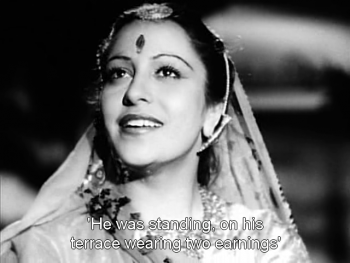 PROFILE:- Ashok Kumar - Oct, 13th, 1911 - Dec 10th, 2001 When Ashok Kumar began his career in cinema, German director Franz Osten wrote him off at the very outset. "You will never make it in films because of your tremendous jaw," the famed director of the classical hit "Achut Kanya" had told Kumar. The year was 1936. During the shooting for "Achut Kanya", in which Kumar played the male lead, Osten hauled up the newcomer numerous times. The nervous Kumar was at his wit's end. Sixty-five years later and with more than 270 films to his credit, Kumar emerged as one of India's celluloid legends. Far from Osten's assessment, the argument now is whether Kumar was not Indian cinema's most enduring lead actor. Born Kumudlal Kunjilal Ganguly at Bhagalpur, Bihar, in 1911, Ashok Kumar was the oldest of the three famous Ganguly brothers - Ashok, Anup and Kishore Kumar. Ashok Kumar spent his early years in Khandwa, Madhya Pradesh. Be it the handsome, soft-spoken lover or the middle-aged crook or later still the affable grandfather, Kumar not only left an indelible mark on the big screen but also won millions of fans as a singer in his earliest films. The song 'Main Ban Ki Chidiya..' he sang for "Achut Kanya" was a rage in its time. Kumar's entry into acting appears to have been accidental. A science graduate, he became a film buff and wanted to make a career as a director. In 1934, he used his examination fee of Rs.35 for a law degree to buy a ticket for Mumbai. He landed up at the Bombay Talkies, then the nerve-centre of India's film world. He was hired by Bombay Talkies owner Himanshu Rai for Rs 150 as a trainee technician and a camera assistant. Months later, he became a laboratory assistant and his salary rose to Rs 250. In 1936, when Rai was producing "Jeevan Naiya", the original hero of the film Najmul Hussein failed to turn up for shooting. Rai asked Kumar to do the make-up. "Jeevan Naiya" was a runaway hit. Kumar's success was confirmed with his next film "Achut Kanya". The astounding success of the film, considered a classic of all times, turned the pair of Kumar and Devika Rani, that had also appeared in "Jeevan Naiya", into a hit combination. Early in his career, he played second fiddle to Devika Rani, and it was with films like Kangan, Bandhan and Jhoola that he was recognised as a hero in his own right. All the three films had Leela Chitnis playing the female lead. Film critics say Kumar's acting career can be clearly divided into three phases. The days of the handsome, soft-spoken romantic hero in enduring films like "Kismet" and "Kangan", the years as tough-talking hero in films like "Sangram," "Mahal," "Samadhi" and "Howrah Bridge" and finally the character actor in films like "Aashirwad," "Mili," "Khoobsurat" and "Shaukeen." He starred in a series of crime films like Sangram, Inspector, Howrah Bridge and Night Club, all in the fifties, when he had stiff competition in the form of Dev Anand, Dilip Kumar and Raj Kapoor. He charmed the audience with movies like Deedar and Bewafaa where he shared the screen with the leading trio of moviedom. With the riotous Chalti Ka Naam Gaadi, he displayed his flair for comedy. In the mid sixties, he turned to character roles, including the suave villain of Jewel Thief and the caring father of Mili. By playing the rapist in Jawab (1970), he broke the conventional mould. It was in Khubsoorat, in 1980, that he played one of his memorable roles. With a repertoire of around 300 movies, he quit the scene due to poor health. He got the most prestigious Dada Sahab Phalke Award in 1988, for his dedicated contribution to Hindi cinema. Fondly called Dada Moni, he was a doyen in the true sense of the word. With his penchant for blending into every character and merging with the role, Ashok Kumar was addictive to filmmakers and audiences alike. For more than six decades, he never acted - he became whatever character he played. Dada Moni acted in 300 Hindi films approximately. 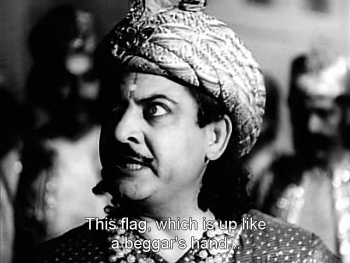 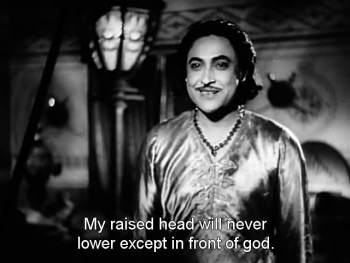 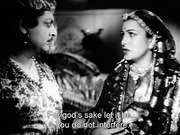 MOVIE REVIEW:- Humayun (1945) Badshah Babar arrives in India from Iran, drives out Ibrahim Lodhi, makes peace with the Hindus and rules Delhi. He also adopts Rajkumari as his daughter and treats like his very own child, even though he has two sons, Humayun and Kamran, and a daughter, Gulbadan. Babar also finds out that Rajkumari is soon to be married to Randhir, the Rajkumar of Chanderi, who is out to avenge the conquest of his native land, by killing Humayun. Before that could happen Humayun falls seriously ill, Babar prays for his survival, but himself becomes ill and passes away, leaving Humayun to recuperate and be crowned the next Badshah. Humayun meets Hamida Bano and both fall in love with each other so much so that he loses all interest in the running of the state. When Delhi is attacked by Jai Singh, Kamran and Khan Bahadur join in the attack, forcing Hamida to flee. Humayun fends off the attackers, but must re-route his armies when Rajkumari is taken hostage. He does manage to rescue her, make amends with Randhir, but loses Delhi to his opponents, and flees to his native Iran. This is where he will meet and marry Hamida, and both will become parents of Shahenshah of all Shahenshah's, Jalaludin Akbar. But before that Humayun must take back his kingdom, and in order to do this he must first take Kabul, then Lahore, and then Agra and finally, if he manages to survive,  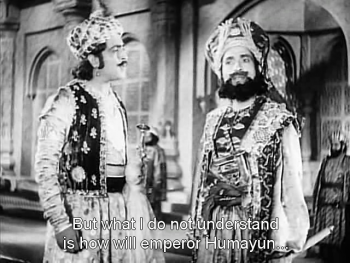  NOSTALGIA 1945 = Film Trade representatives resign from the Film Advisory Committee. - Chetan Anand's Neecha Nagar shown in Cannes film festival. - New Thetres' last known film Humrahi released. - Dev Anand debuted in films with Hum Ek Hain which got released in '46. - V G Damle of Prabhat Film Co. died. - Guru Dutt made his debut with the release of Lakha Rani. POPULAR FILMS OF 1945 1. Amrapali : Nandlal Jaswantlal - Prem Adib, Sabita Devi, Jiwan 2. Ghazal : Zahur Raja -Lila Chitnis, Radharani 3. Humayun : Mehboob - Ashok Kumar, Nargis 4. Panna Dai : Ram Daryani - Durga Khote, Chandramohan, Minakshi 5. Lakha Rani : V Bedekar - Guru Dutt, Durga Khote 6. Zeenat : S H Rizvi - Noor Jahan, Yakub, Karan Diwan POPULAR SONGS OF 1945 1. Diya Jala Kar Aap Bujhaya : Badi Maa - Noor Jahan 2. O Varsha Ke Pehle Badal : Meghdoot - Jagmohan 3. Badariya Baras Gai Us Par : Moorti - Khursheed, Mukesh 4. Dil Jalta Hai To Jalne De : Pehli Nazar - Mukesh 5. Baithi Hoon Teri Yaad Ka : Village Girl - Noor Jahan 6. Aahen Na Bhari : Zeenat - Noor Jahan, Kalyani, Zohrabai Total Films Released : 99 Hindi : 73 Bengali : 9 Tamil : 11 Telugu : 5 Kannada : 1 Others  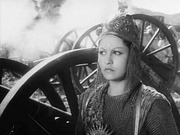 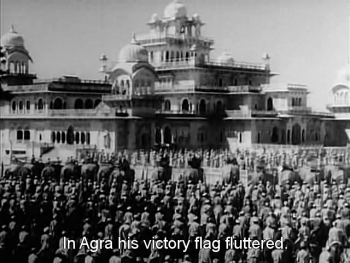 .  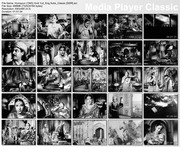 SAMPLE-1 ... SAMPLE-2 SYNOPSIS:- Humayun (1945) Mughal emperor Humayun (Ashok Kumar). Advocating communal harmony, a policy prompted by contemporary developments, the film stresses the friendship between the victorious Babar (Nawaz) and the defeated Rajputs; he asks the Rajkumari (Veena), daughter of the slain Rajput King, to assume her father’s throne and to regard Babar as a father. In the latter part the story, Humayun sacrifices his kingdom to save the Rajkumari. Hamida Bano (Nargis) is a commoner with whom Humayun falls in love, but who turns down his offer of marriage claiming that women, for all kings, are mere playthings. The major highlights of the film are the elaborate Mughal sets and the spectacular battle scenes with elephants and horses. Cecil B.DeMille described the film, in a letter to the film-maker, as a ‘masterpiece of lighting composition. TECHNICAL SPECIFICATIONS:- Video Codec: XviD ISO MPEG-4 Video Bitrate: 744 kbps Video Resolution: 640x480 Video Aspect Ratio: 1.333:1 Frames Per Second: 29.970 Audio Codec: 0x0055 MPEG-1 Layer 3 Audio Bitrate: 115kb/s VBR 48000 Hz Audio Streams: 2 Audio Languages: Hindi RunTime: 1:51:54 Subtitles: English Ripped by: Trinidad [DDR] Duration: 1:51:54 FOR OTHER RELEASES IN MY FESTIVAL OF FILMS CLICK HERE "INDIAN CINEMA - THE EARLY YEARS 1915-1949" and CLICK HERE "INDIAN CINEMA - THE GOLDEN YEARS 1950-1965 PART - I" CLICK HERE "INDIAN CINEMA - THE GOLDEN YEARS 1950 - 1965 PART - II" Sharing WidgetTrailer |

All Comments